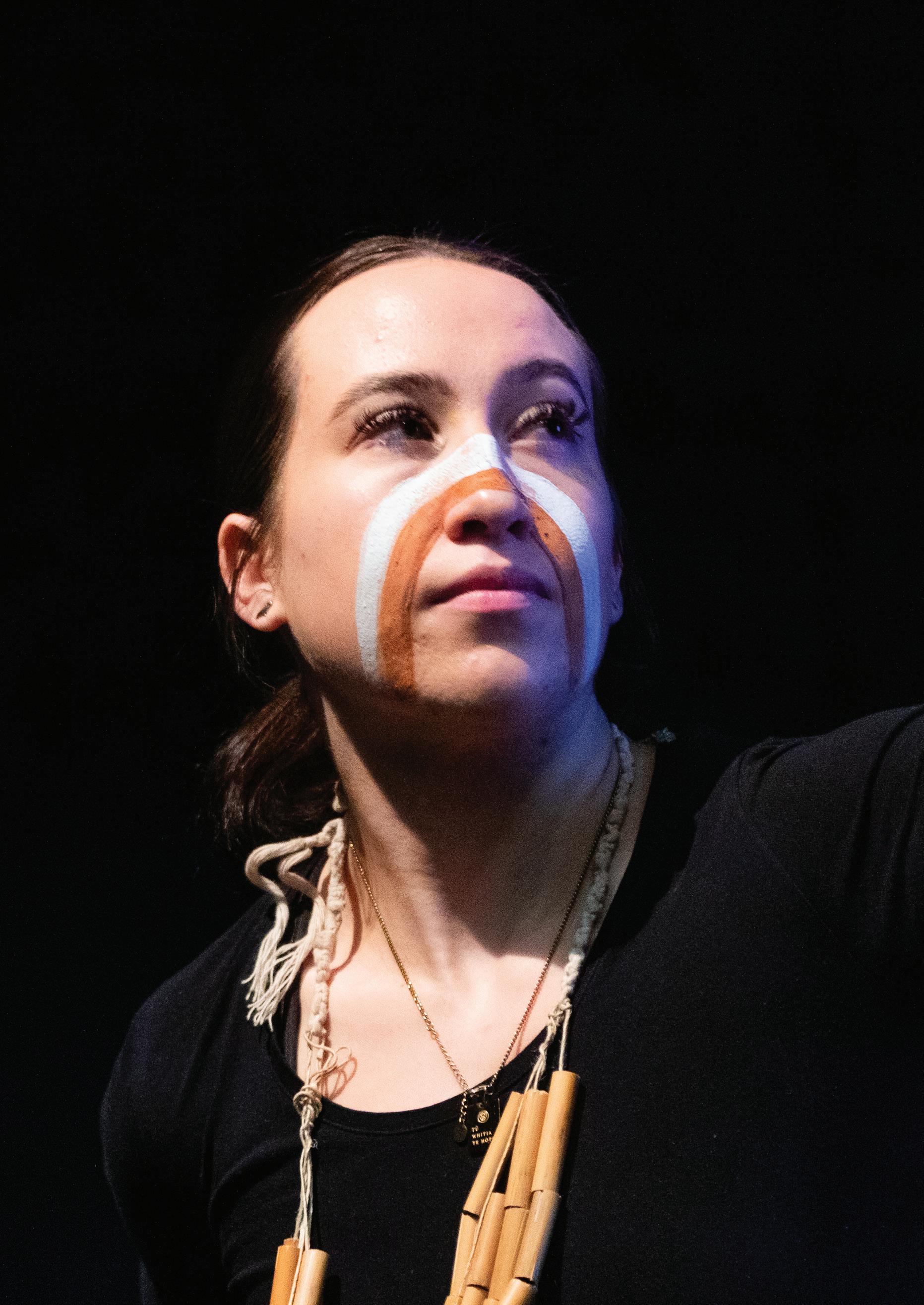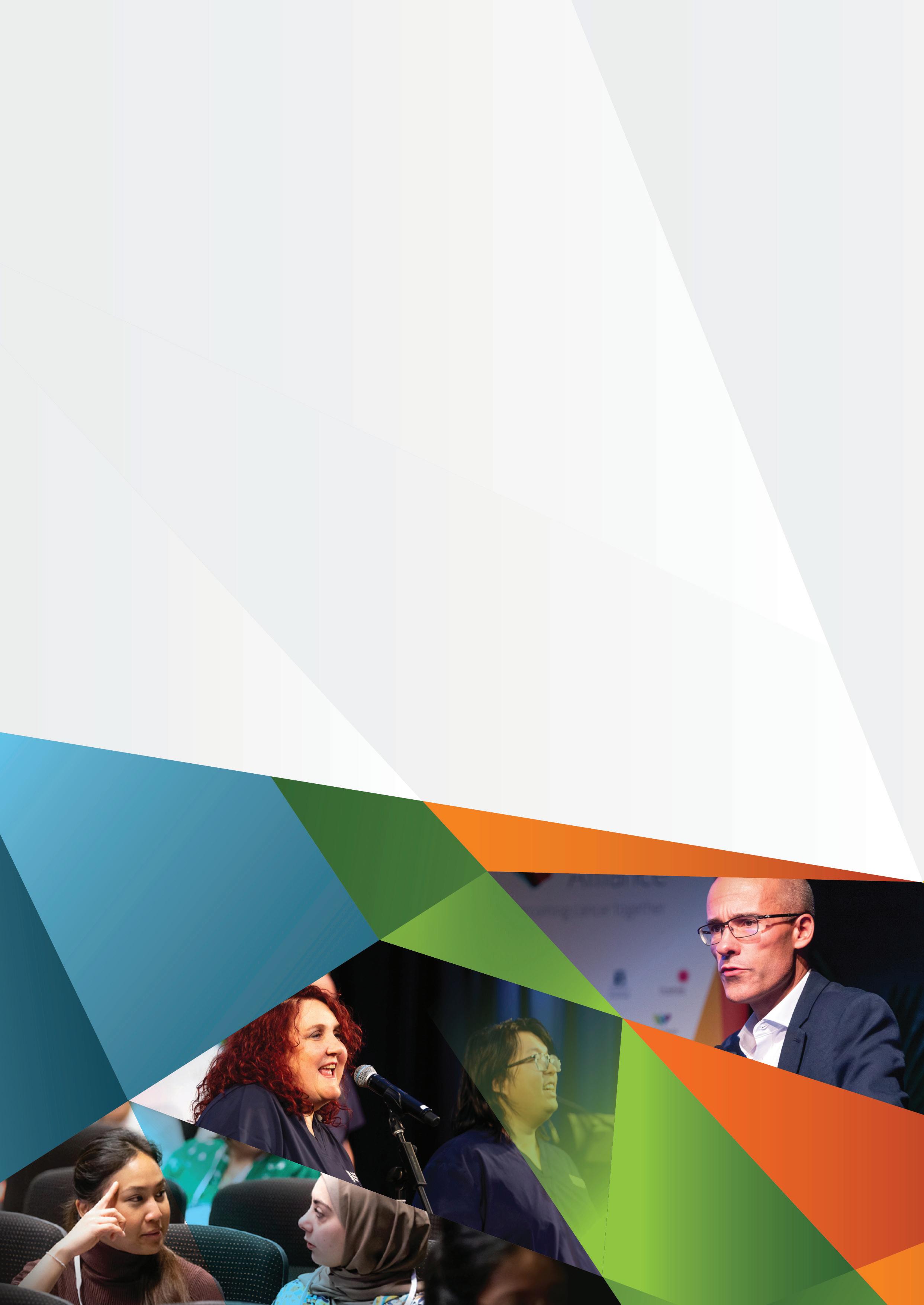




To save lives through the integration of cancer research, education, and patient care. Through innovation and collaboration, the VCCC Alliance will drive the next generation of improvements in prevention, detection, treatment, and survivorship for all.
United
Collaborative Spirit
We foster a culture of collaboration and bring together researchers, clinicians, healthcare professionals, and consumers to work as one cohesive unit towards a common goal to eliminate cancer.
Shared Vision
United in our commitment, we work tirelessly to advance cancer research, treatment, and education. We share knowledge and resources to achieve the best outcomes for people affected by cancer and the broader community.
Dignity and Compassion
The expertise of our members and the shared experience of consumers, helps us to recognise the individual needs and circumstances of those who have received a cancer diagnosis and those who work with them.
Inclusive Excellence
We commit to create an environment where diverse perspectives are valued, to ensure that every voice is heard and respected – from patients and their families to our staff and community partners.
Our values guide strategic planning and daily operations, to ensure that every action taken aligns with our mission to lead in the fight against cancer through high-quality treatment, innovative research, and dedicated patient care.
Pioneering Innovation
Together, we courageously pursue groundbreaking research and innovative treatment options, and with our partners, push the boundaries of what is possible in cancer prevention and control.
As leaders in the field, we are bold in our decisions. We consider taking necessary risks to help advance cancer care, research, and education, and aim to establish new benchmarks of excellence on a global scale
Patient-Centred
Individualised Care
Our approach to care is to ensure it is informed by the breadth and depth of our collective knowledge and expertise and tailored to the individual needs, preferences, and values of patients, to ensure lived experience is at the centre of every decision we make.
A commitment to integrate the expertise of a lived experience in governance, design and implementation ensures patient-centredness as our core. We foster a learning environment to demonstrate quality engagement practices.
Equitable Access
We strive to create a cancer sector that provides all individuals, regardless of background, ability, geography, or socioeconomic status, access to the highest quality cancer care, research, and education
Community and Global Impact
Our commitment extends beyond our immediate community; we aspire to make a global impact by sharing knowledge, fostering partnerships, and advocating for cancer prevention, detection, treatment, and survivorship for all.

What an absolute privilege it has been to lead the VCCC Alliance as Board Chair the past year.
This opportunity has enabled me to channel more energy into what I am most passionate about – improving outcomes for all people affected by cancer in our state.
Often, leadership brings opportunities to advocate for patients both here and further afield, including through strengthening links internationally. So it was with the visit of US Ambassador to Australia, Ms Caroline Kennedy, who we hosted for a tour of the VCCC building in February along with her spouse Dr Edwin Schlossberg and the US Consul General, Ms Kathleen Lively.
Earlier in February, the US Mission in Australia had launched the US-Australia Cancer Moonshot Initiative, an extension of the US Cancer Moonshot announced in 2016, to deepen cooperation in the research, prevention, and treatment of cancer between our two countries. There are many synergies, and enormous potential in this expansion in US-Australia cancer collaborations. The Ambassador retraced the steps of incumbent President Joe Biden who attended the opening of the VCCC building in 2016, expressing a keen interest in improving equitable access to care and better outcomes for Indigenous peoples. Ambassador Kennedy went on to attend the Third World Indigenous Cancer Conference (WICC).
Sponsored by the Victorian Government and hosted by the VCCC Alliance in partnership with the World Health Organization’s International Agency for Research on Cancer, the conference took place from 17 to 20 April 2024 and attracted 622 delegates from around the globe.
The VCCC Alliance really is a sector leader in equity, and this leadership includes appointing the first Research and Education Lead for Aboriginal and Torres Strait Islander Health, Associate Professor Kalinda Griffiths, who was also the co-convener of WICC along with founder Professor Gail Garvey AM.
I’m proud to report our gains in progressing equity for people experiencing cancer continues to grow with programs funded by the Victorian government this year. In addition, we continue to lead in making it the new norm to involve consumers in all that we do, including modelling best practice and process in consumer-led research projects – and I thank our dedicated consumers.
As the Alliance continues to strengthen its role in Victorian cancer control, the members approved the implementation of a new governance structure that will combine both member nominated directors and independent directors, positioning us for future growth, funding opportunities and long-term sustainability. Member engagement will continue to be a priority with the creation of a Member’s Forum ensuring our work is guided by researchers and clinicians across the cancer sector. Our first three independent directors were appointed in late 2023 and bring skills across government, regional Victoria and First Nations communities.
At the heart of this governance structure and our new fiveyear strategy is a commitment to excellence and inclusion. I thank my fellow Board Directors for their dedication to our cause, and look forward to working with them, Chief Executive Prof Grant McArthur AO, the leadership team and all alliance staff as we advance cancer research, treatment and care equitably for all into the future.
Professor Sanchia Aranda AM
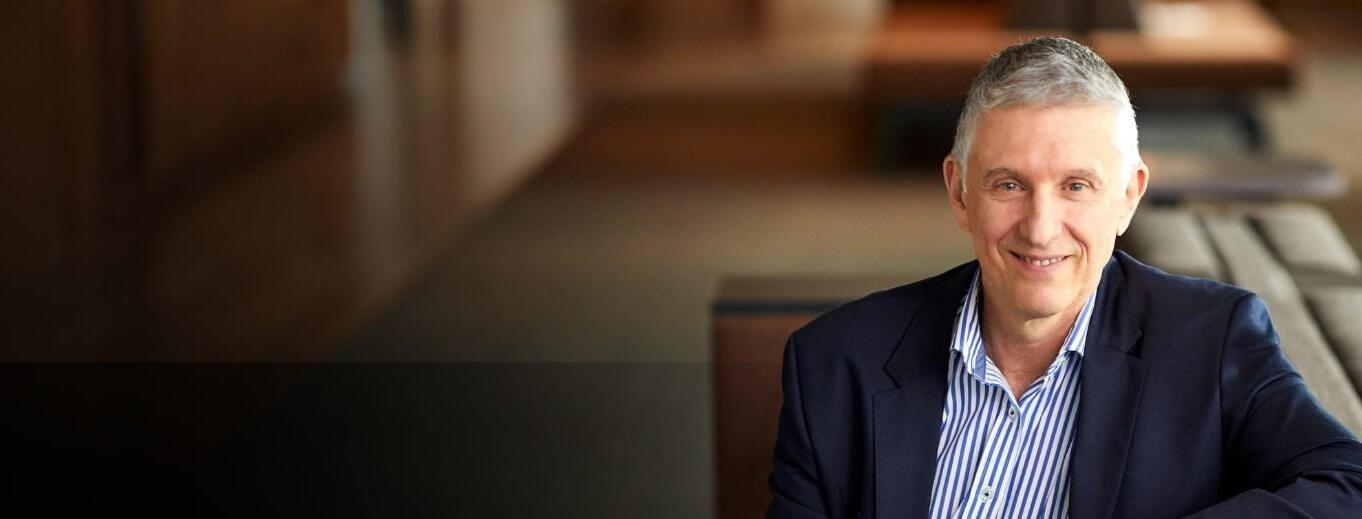
No matter who you are, or where you live.
Everyone should have access to the best cancer treatment, care, and chances of survival.
This is the reason I pursued the role to lead the VCCC Alliance, and it remains my mantra today. Most importantly, it is one of the key values underpinning our alliance – For All. The alliance is and always has been a collective effort to ensure all Victorians who experience cancer, also experience the best opportunities for care. The best treatment and care means better chances of survival. And ongoing, funded research is vital to continuing to offer the best treatment and care, everywhere.
We’ve made many gains towards this goal the past year, but much work remains to be done. We have a long way to go to ensure equity of access to cancer health services – to Victorians in regional and rural areas, Aboriginal and Torres Strait Islanders, culturally and linguistically diverse people, gender diverse and LGBTIQA+ communities.
But I am immensely proud of what we have achieved together in the past year, including becoming the first Australian state to establish a statewide regional cancer network. Mildura Base Public Hospital became the final regional centre to join the VCCC Alliance Regional Partnerships Program in 2024, providing a boost to Victoria’s already strong capabilities in the cancer sector by enabling the sharing of resources, knowledge and experience, including targeted education programs to address skill gaps in the cancer workforce that will result in improved patient outcomes.
Having a strong local, national and international profile and connecting through networks are crucial to leveraging our efforts to support people affected by cancer in our state.
Our second Research Conference – Beyond the Breakthroughs – held in 2023 enabled us to strengthen these ties.
Attended by several high-profile international keynote speakers, the two-day event showcased the latest advances in understanding the causes of cancer, efforts towards cures, and promising treatments and technologies. As always, consumers – those who experience cancer – played a significant role in contributing to and participating in this landmark event.
Hosting the Third World Indigenous Cancer Conference offered the opportunity to continue to play a leading role in the sector to advocate towards equity of cancer care for Indigenous peoples, and highlight the many issues and barriers affecting our Aboriginal and Torres Strait Islander communities in Australia.
While the funding for VCCC Alliance programs creates challenges, it was notable that our two funded programs in the 2024-2025 Victorian government budget receiving $7.5 million over four years were for Health Equity, and in particular, palliative care delivered in the regions.
With a new Board at the helm, the future is bright for the alliance as we forge a new path forward, breaking new boundaries in the implementation of our next five-year strategy which is very aligned with the Australian and Victorian cancer plans.
My sincere thanks to all the Board members, and in particular to those departing from some of our member organisations, who have served with such distinction and remain vital leaders in our alliance. Special thanks to our Chair, Professor Sanchia Aranda AM for her support in a challenging year. I also extend my gratitude to our dedicated leadership team for their efforts in working with you, our members, and our staff as we all work together to improve outcomes for people who experience cancer.
And finally, thank you to all our members who have been with us from the very beginning, and those partners who have since come on the journey with us. Your support and vision is valued, and I look forward to what the next year will bring.
Chief Executive Professor Grant McArthur AO
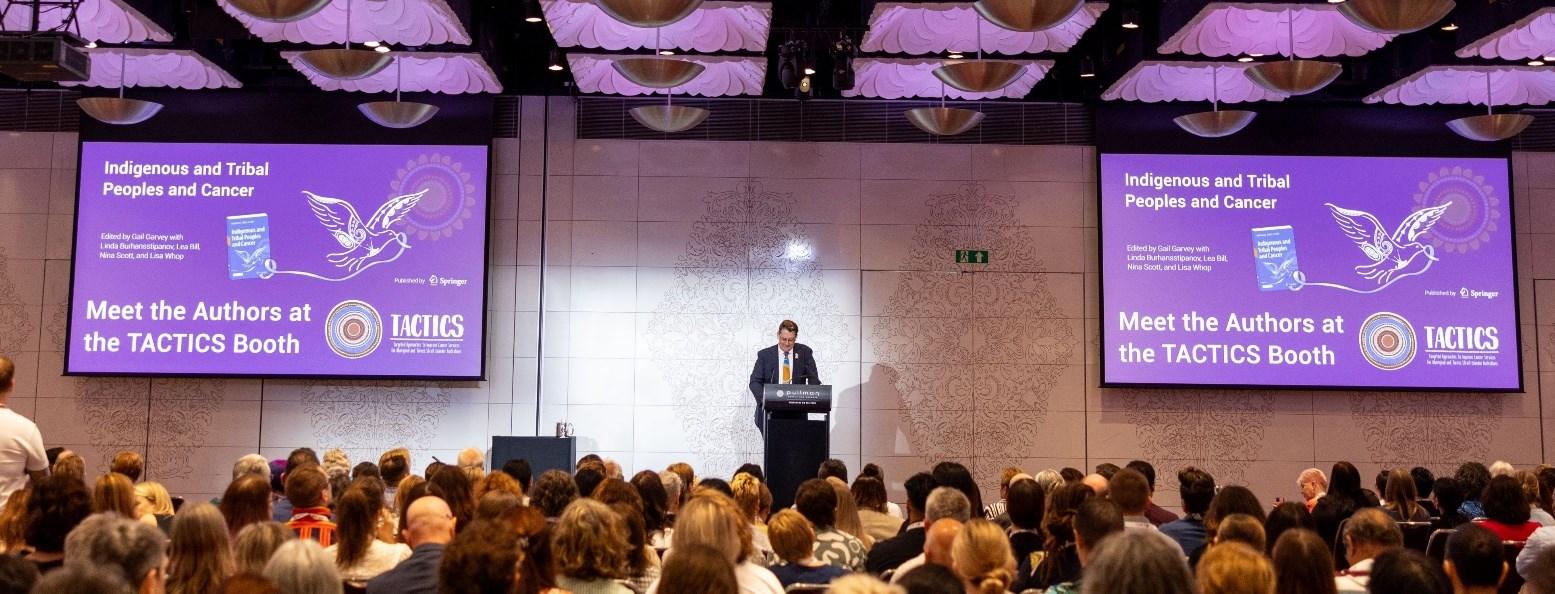
The third World Indigenous Cancer Conference (1720 April 2024) was the largest global gathering of Indigenous and non-Indigenous cancer researchers, clinicians and community members, focused on improving cancer outcomes for Indigenous peoples.
Sponsored by the Victorian Government and hosted by the VCCC Alliance in partnership with the World Health Organisation’s International Agency for Research on Cancer, the conference attracted 622 delegates globally. A/Prof Kalinda Griffiths, VCCC Alliance Research and Education Lead for Aboriginal and Torres Strait Islander Health, co-convened the event with conference founder and WICC foundational convenor, Prof Gail Garvey AM.

A stirring Welcome to Country was performed by Uncle Tony Garvey. Victorian Minister of Health, the Hon Mary Anne-Thomas MP gave an opening address, while other VIP guests included Aunty Pat Anderson AO, Uncle Tom Calma AO, and US Ambassador to Australia Ms Caroline Kennedy.
An Elder and Youth Forum identified priorities for the conference to address, including support for families and carers, Indigenous leadership, prevention and screening, cultural safety, cancer pathway navigation, personalised care, and the role of traditional medicine.
Conference presentations covered aspects of the cancer journey from screening and early detection, to access to quality and safe palliative care on ancestral lands. There was a focus on lung cancer screening, and the opportunity to develop a screening program that works for all. Tackling racism within colonial health structures was discussed, showcasing innovative work across the globe.
VCCC Alliance Research Conference
‘Affirming’, ‘inspiring’, ‘informative’ and ‘brilliant’ – just some of the words delegates used to describe the VCCC Alliance Research Conference, held 11 to 13 September 2023 at the Melbourne Convention and Exhibition Centre.
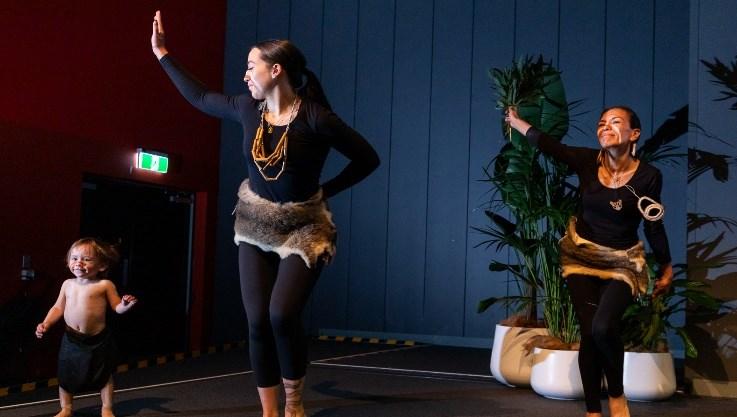
More than 400 delegates gathered to experience the unique multi-disciplinary programming – bringing consumer perspectives and the real-world impact of research to the fore. The conference was led by two Master of Ceremonies, Julie McCrossin AM, and A/Prof Shalin Naik. International keynote Prof Charles Swanton from the UK’s Francis Crick Institute grabbed everyone’s attention by examining the role of air pollution in the development of lung cancer, while Prof Dorothy Keefe’s roadmap for the new Australian Cancer Plan and Prof Michelle Haber’s presentation on towards zero deaths from childhood cancers was cause for optimism.
Four workshops provided hands-on experiences in clinical trials, genomics, and AI applications in cancer care, emphasising the transition from awareness to actionable insights in cancer treatment and research.
Other highlights included the VCCC Alliance Cancer Communities Forum, enhancing networking opportunities and community involvement, and a conference dinner at the Arts Centre Melbourne featuring tributes to Dame Olivia Newton-John AC OBE, performances by the Royal Melbourne Hospital Scrub Choir led by Dr Emma O’Brien OAM, and the inaugural VCCC Alliance Leading for Impact Award winners.
In December 2023, the Victorian Government announced a $1.6 million investment aimed at enhancing the impact and contribution of lived experience to cancer care, research and education in Victoria.
The funding will enable evidence to be generated and help reshape leadership perspectives among consumers and collaborators across the cancer sector, all aimed at enhancing outcomes reflecting patient needs and values.
The project fosters a unique collaboration harnessing the expertise of consumers – those with a lived experience of cancer – and staff across the VCCC Alliance, Monash Partners Comprehensive Cancer Centre (MPCCC), Regional Trials Network Victoria (RTN-Vic), Cancer Council Victoria (CCV), and is academically supported by researchers from the Collaborative Practice Centre, University of Melbourne. The initiative was officially launched at the VCCC Alliance Consumer Forum in December 2023, with the Hon Tim Richardson MP.

We were honoured to welcome the US Ambassador to Australia, Ms Caroline Kennedy, her spouse Dr Edwin Schlossberg and the US Consul General, Ms Kathleen Lively, for a tour of the VCCC building in February 2023.
The visit, which included Peter McCallum Cancer Centre, University of Melbourne Centre for Cancer Research and The Brain Cancer Centre at WEHI, highlighted exciting opportunities to build on existing connections and explore new pathways for collaboration and between Australia and the US.
Cervical cancer control, brain cancer research and trials, melanoma treatments and new therapeutics were high on the agenda as part of the recently announced US-Australia Cancer Moonshot Initiative.
Retracing some of the steps that incumbent President Joe Biden took in 2016 when he attended the opening of the VCCC building, the Ambassador was clearly impressed by the ambition, scale and scope of the research taking place. She commented particularly on the connectivity and collaborations that are such a hallmark of the precinct and how this is employed to accelerate progress.
The Ambassador also expressed a keen interest in improving equitable access to care and better outcomes for Indigenous peoples.
The uniqueness of the program lies in its consumer-led approach, where consumers are not only active participants but key decision-makers. With significant consumer representation across various roles and functions, including governance, consumer-led research, co-design and delivery of education modules, and mentors, the program ensures diverse consumer voices are at its heart.
The program aims to directly engage with consumers from across Victoria, making it truly consumer centric. Most importantly, a statewide network of consumer leaders will be developed.
It will build knowledge and skills for consumers and organisations who engage with them, and ultimately enhance patient outcomes for those experiencing cancer.
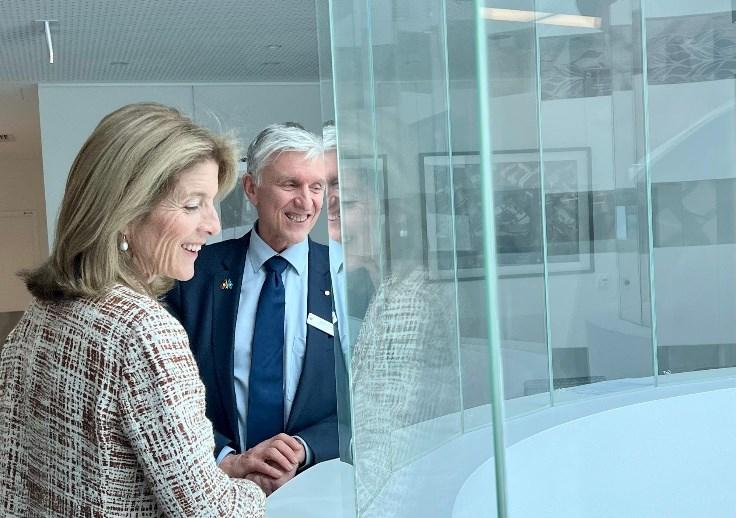
“It’s tremendously exciting and important that Ambassador Kennedy is actively pursuing expansion in USAustralia cancer collaborations. There are some great synergies, and the potential is enormous,” said Prof Grant McArthur AO, who is a member of the Ambassador’s Australian cancer advisory group.
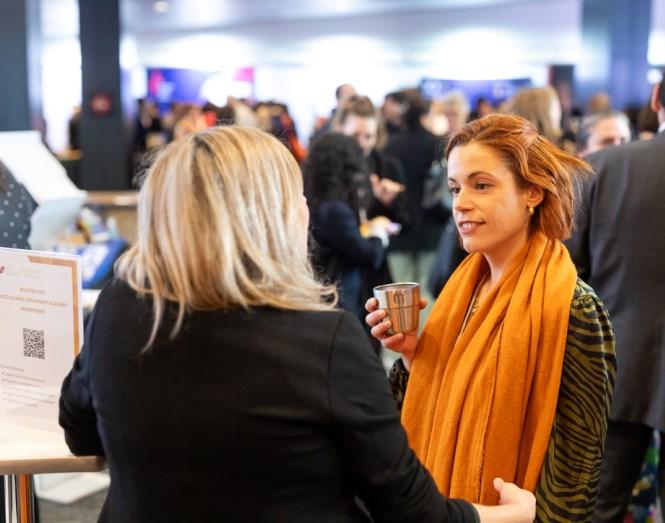
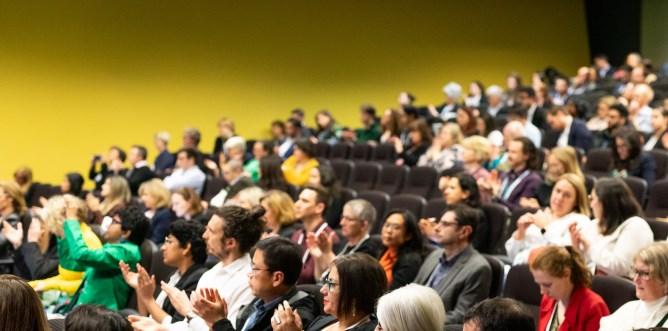

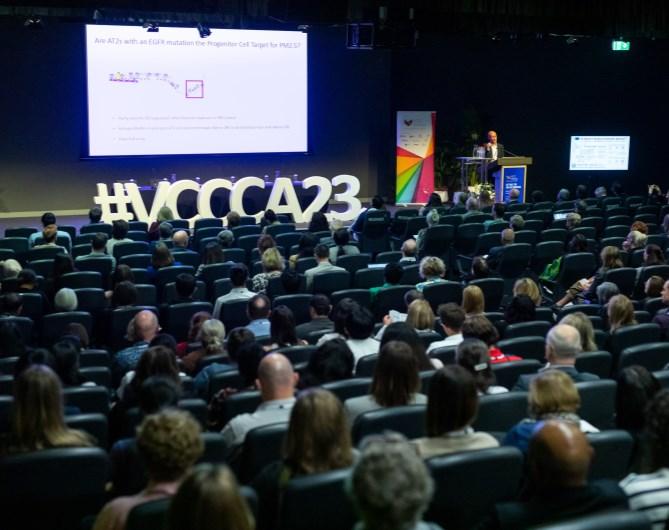

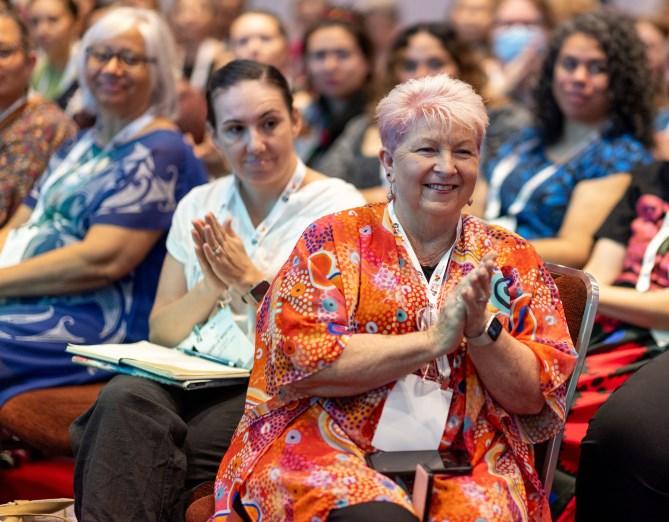
Over
1.7K
Consumer
1.5K
Investigator
1.2K



Data-driven research is opening windows to earlier cancer diagnosis
Data Connect is enabling researchers to access a vast database to study factors that contribute to delayed cancer diagnosis, and treatment across the continuum of cancer care.
After many years in development, the program – which officially launched in 2023 – has provided clear evidence in multiple tumour streams that patients have increased GP clinical activity from six months pre-diagnosis, indicating a diagnostic window where potential opportunities exist for earlier diagnosis.
Interventions during this window to help identify patients and promote appropriate use of imaging and direct specialist centre referrals have the potential to improve earlier diagnosis and impact patient outcomes.
The insights from researchers include research into lung and colorectal cancers, and sarcoma. This includes evidence that in Australia delayed diagnosis results in poorer outcomes for lung and colorectal cancer patients, and evidence for utilising linked heath data in risk prediction projects to expediate cancer diagnosis in general practice.
A major collaboration between VCCC Alliance, University of Melbourne and BioGrid Australia, the goal is to link clinical, biological, genomic and patient experience data to expand a data-rich discovery platform.
In an Australian-first for cancer research, the Data Connect program in 2023 successfully linked its general practice dataset, Patron (Primary Care Audit, Teaching and Research Open Network) to the Centre for Victorian Data Linkage (CVDL). Patron is the University of Melbourne’s primary care database of de-identified electronic medical records of over four million patients from 129 consenting Victorian general practices.
The Centre for Victorian Data Linkage contains numerous datasets, including statewide hospital administrative data, the Victorian Cancer Registry, and the National Death Index.
This linkage has provided a database of 1.8 million deidentified patient data and the ability to conduct a range of research projects along the continuum of cancer care, including:
• Diagnostic and treatment pathway
• Equity of access to timely treatment
• Risk prediction
• Post treatment and survivorship.
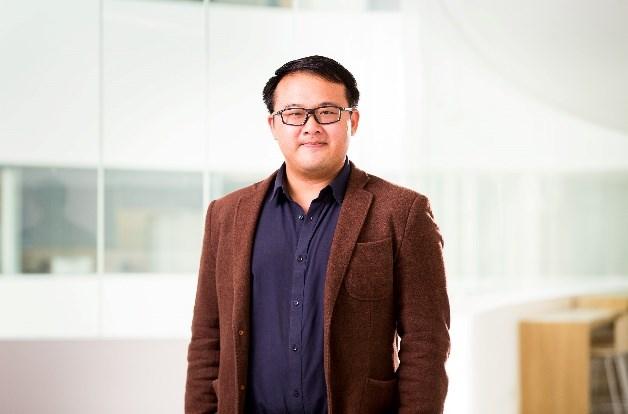
Dr Zhang is a general practice PhD candidate at the University of Melbourne who has studied the timeliness of lung cancer diagnosis and treatment in Victoria, as part of the VCCC Alliance Data Connect project. Jianrong’s lung cancer study is the first to document the length of the journey that patients experience in the Australian healthcare system for lung cancer diagnosis and treatment, starting from their first presentation in primary care. He has a desire to help lung cancer patients with better survival outcomes by diagnosing cases earlier.
The Personalised Cancer Care program developed a Precision Oncology Roadmap in partnership with Monash Partners Comprehensive Cancer Consortium (MPCCC).
Based on an extensive stakeholder consultation process, including insights garnered from the hugely successful Victorian Precision Oncology Summit, the Roadmap outlines a series of recommendations and actions needed to ensure a more equitable uptake of molecular testing for cancer patients.
Molecular testing can help to identify the underlying drivers of cancer, potentially optimising treatment and sometimes providing a more accurate diagnosis. The Roadmap will be an important contribution to inform the National Genomics Framework being developed by Cancer Australia as part of the Australian Cancer Plan.
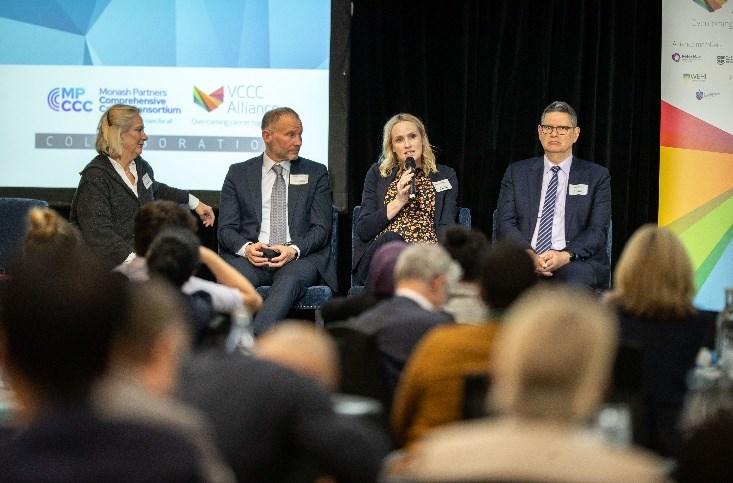
The work of the VCCC Alliance-funded and created Centre for Cancer Immunotherapy, a collaborative laboratory space in the VCCC building, came under the spotlight in 2024.
Headed by Prof Joe Trapani AO, the centre is developing groundbreaking new approaches to treating chronic Hepatitis B infection and liver cancer with cutting-edge mRNA technology. Liver cancer patients have a very low survival rate of just 23 per cent and the disease disproportionately affects Aboriginal and Torres Strait Islander and culturally and linguistically diverse communities.
Researchers are testing an RNA-based technology to destroy the virus’s ability to spread to uninfected liver cells. By eradicating the virus early, the inflammation can subside, and liver cancer is far less likely.
Prof Trapani said once the treatment is tested in animal models and can start human clinical trials, the goal is to have the treatment available to patients within five years.
Primary liver cancer, or Hepatocellular Carcinoma (HCC) is cancer that starts in the liver. It is often preceded by longterm liver inflammation due to chronic Hepatitis B Virus (HBV) infection. Alcohol, obesity and type 2 diabetes and Hepatitis C are other leading causes of primary liver cancer. In Australia, HBV is the cause of about 25 per cent of all liver cancers, but in other countries in our region, HBV is even more common.
The two major programs of work around liver cancer include:
• Use of CRISPR-Cas13 to destroy Hep B virus mRNA – a project led by Dr Mo Fareh (Peter MacCallum Cancer Institute) and Prof Peter Revill and A/Prof Margaret Littlejohn (The Peter Doherty Institute of Infection and Immunity). If effective, this approach would limit liver inflammation and scarring, and prevent or delay the onset of HCC. Ultimately, the intervention would be delivered by lipid nanoparticles, which are the delivery vehicle for several COVID-19 vaccines.
• Understanding how to make immune-based cancer therapies more effective in liver cancer – While immunotherapy is sometimes helpful in HCC, it is important to understand why some cancers such as melanoma respond commonly, while liver cancer does not. This work aims to (i) understand how the liver cancer itself suppresses the immune system and (ii) develop mRNA vaccines based on antigens (a type of marker that tells your immune system whether something in your body is harmful or not) expressed by hepatitis B and the cancer itself.
In 2018, the Centre for Cancer Immunotherapy opened as a collaboration between the VCCC Alliance, Peter MacCallum Cancer Centre, and the University of Melbourne in the VCCC building in Parkville.
The Centre is now home to about 40 researchers and clinicians from six Victorian institutions across multiple disciplines. Other major collaborators now involved across projects include The Royal Melbourne Hospital, St Vincent’s Hospital Melbourne, Peter Doherty Institute, The Alfred, and Austin Health.

Acceleration programs have driven the implementation of evidence into routine care, improving outcomes for people affected by cancer.
One of the key areas of focus is innovation in clinical trials. Resources have been developed that support the capabilities of the workforce who deliver clinical trials, as well as improving access for participants across Victoria.
Educational events in the reporting period were around Registry Trials, which are trials that enrol real-world patients from clinical registries:
• Two in-person Registry Trial events, supporting tailored workforce education and networking.
• Two educational sessions at conferences (COSA, Australian Clinical Trials Alliance) to disseminate the Registry-based clinical trial methodology to wider audiences.
• In addition, 10 online workshops to develop Excel and Metrics reporting skills were attended by 170 participants. The courses were designed to upskill the workforce with the technical skills required to report clinical trial metrics as per the National Clinical Trial Governance Framework (NCTGF) and to support unit business management.
3000 Registry-based trials landing page visits
600 Business Course for Research Managers users

A range of activities and initiatives have supported faster implementation of new evidence into practice through the Distributed Leadership program, renamed the Collaborative Leadership program.
Research and Education Leads have represented breast, head and neck, brain, lung, gastrointestinal, genitourinary, gynaecological, and skin cancers, and sarcoma.
The areas of Aboriginal and Torres Strait Islander health, primary care, regional oncology, cancer nursing, palliative care, translation, and implementation science were also led by academic chairs, both from member and nonmember organisations.
Highlights over the reporting period have included:
• The rapid translation of research into practice, demonstrated by the Peter MacCallum Cancer Centre adopting a more conservative approach to melanoma excision following the April 2024 Optimising Multidisciplinary Care of Melanoma Patients symposium.
• A workshop on Implementing Neoadjuvant Immunotherapy – Optimising Treatment for Resectable Stage II-IIIB Non-small cell lung cancers was held in May 2024 to identify the specific steps and resources required for effective implementation in both member and non-member clinical settings.
• A symposium on oral and oropharyngeal cancers in partnership with Dental Health Services Victoria, held in July 2023.
• A full-day Gynae-oncology Nursing Symposium in July 2023 - Gynaecological cancers: Management, supportive care and survivorship issues, with 115 attendees. The program included a dedicated consumer session, with five consumer representatives from the Australian and New Zealand Gynaecological Oncology Group (ANZGOG) Survivors Teaching Students program.
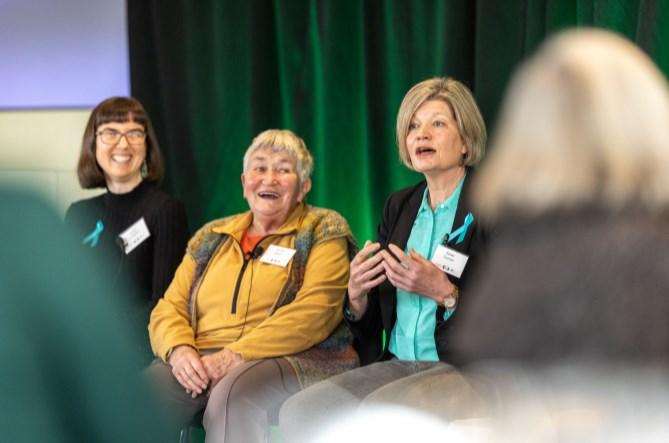
A symposium dedicated to cancer prevention and early detection was held in June 2024, with organisers led by A/Prof Kara Britt, Co-Chair of the VCCC Alliance Accelerating Novel Therapies Steering Committee, hoping to make this a regular event on the Alliance event calendar.
Attended by more than 100 delegates and attracting national and international speakers, the PREDICT Symposium 2024 – Innovations in Cancer Prevention and Early Detection: A Symposium for the PRevention and Early DetectIon Cancer NeTwork, aimed to bring together cancer prevention and early detection professionals to share knowledge and foster collaboration.
“As a breast cancer researcher working on the mechanisms underlying risk, I find it hard to stay across all of the new knowledge and intersecting work that is being produced along the cancer risk and early detection continuum,”
A/Prof Britt said. “This symposium came out of that drive that I think we all share – the drive to be aware of, and have access to, the best cancer prevention and screening research, treatments and programs available.”
“I was treated by supportive nurses and doctors. I allowed myself to get well. Without a screening test, early diagnosis is our best chance at improving survival rates.
- Ovarian cancer survivor, Karen Curnow, presenting at the Gynaeoncology Nursing symposium
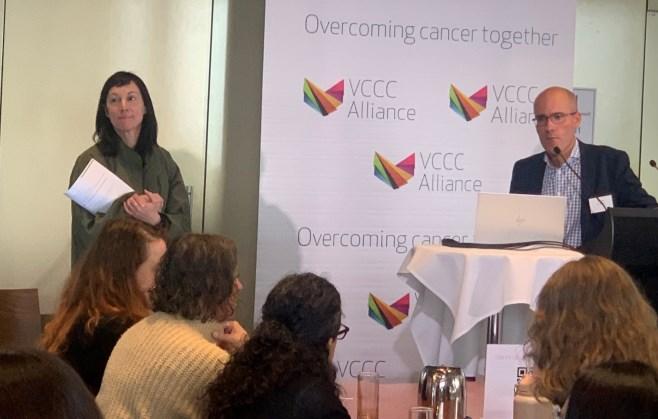
The one-day symposium provided an overview of the molecular basis for cancer prevention and explored potential preventive strategies, gave insights into health economics and policy considerations, identified challenges to implementing screening and explored ways to increase participation and address inequity.
Dr Natalie Diepenhorst, a consumer advocate and medical researcher, shared her experience about her bowel cancer diagnosis, treatment and survival.
Prof Charles Swanton, from the Francis Crick Institute UK, who also spoke at the VCCC Alliance Research Conference, was the keynote speaker about the role of the environment in cancer. Prof Swanton proposes that PM2.5 (particulate matter that has a diameter of 2.5 micrometres) promotes lung cancer by acting on cells with pre-existing genetic mutations in healthy lung tissue.
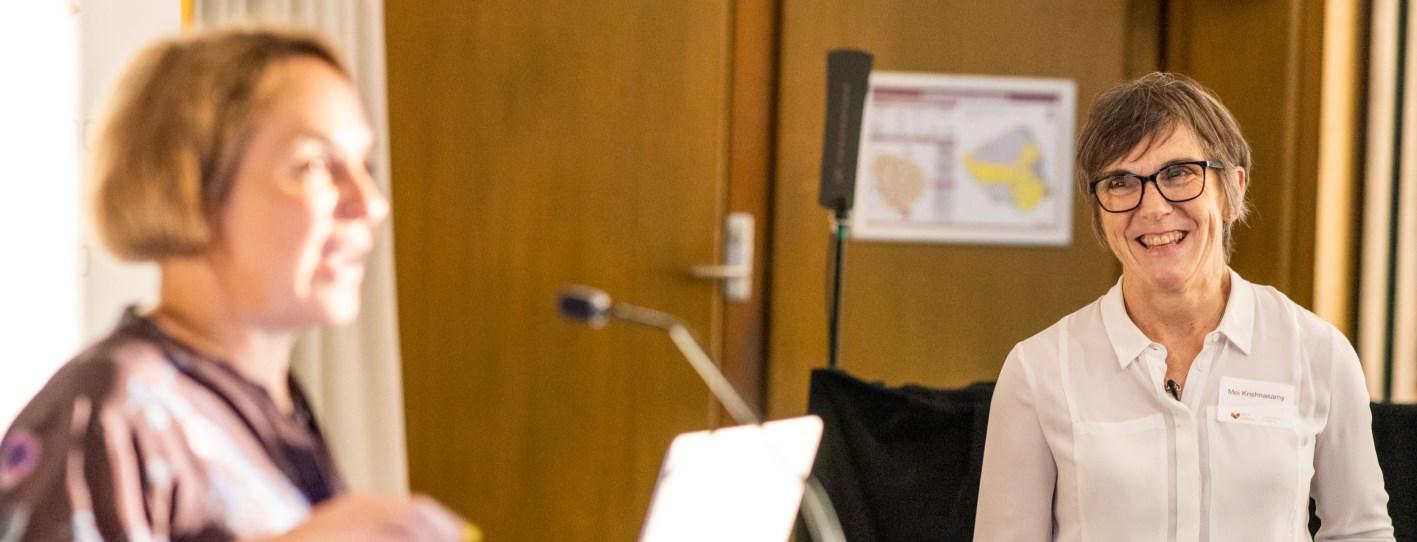
The Centre for Cancer Education learning hub has continued to provide high quality programming targeting the learning requirements of the cancer workforce. Over the past year, the program has delivered more than 160 live educational activities to more than 9,000 attendees.
A huge success, the program has exceeded its target of reaching 23,400 participants, instead, engaging a total of 27,334 participants between 2021 and 2023.
Nurses are the largest component of users, followed by clinical trials staff, allied health professionals and those who identify across multiple disciplines. The platform will continue to help build external relationships and provide internal education, supporting all VCCC Alliance programs of work.
The platform has 1946 registered users and 21,000 unregistered users. Of those, most are national at 15,000 Australia-wide, and 6000 internationally-based, with 4200 from the US. An evaluation has shown that two-thirds of respondents intended to change their practice as a direct result of attending an educational program, and almost 90 per cent intend to apply the knowledge, skills, and attitudes they learned to their occupational role. Over 90 per cent also reported they were satisfied with the educational programs, exceeding the program target of 70 per cent.
The Leading for Impact program aimed to build diversity and excellence in leadership across the cancer sector through equitable and exceptional programs that support empowerment, unity, cultural change and improved patient outcomes and experiences.
It developed two flagship programs, the Leadership Academy Excellence Program and the Nurse-led Research Hub Essential Research Skills for Clinical Nurses course, both designed in collaboration with clinicians, researchers, and consumer advocates.
The Essential Research Skills for Clinical Nurses online training course, endorsed by the Australian College of Nursing, embeds consumer engagement strategies, and research ethics and governance resources.
Building the research capability and capacity of the nursing workforce across Victoria has been the overriding goal of the program since its inception. While the scenarios and examples provided are cancer-related, the knowledge gained, and skills developed can be applied to any clinical setting.
Since launching in September 2023, 96 nurses have enrolled in the Essential Skills course from more than 30 organisations across Australia and New Zealand.
CCE Events 2023-2024
“Research shows that when patients are cared for by informed specialist cancer nurses, they have a better quality of life and longer survival duration, and the health system benefits from more efficient care,” said Prof Mei Krishnasamy, the program champion of the Nurse-led Research Hub.
Meanwhile, paediatric cancer nurses across Australia and New Zealand were supported to undertake the course following an investment by the Children’s Cancer Foundation (CCF).
CCF funded a Paediatric Scholarship and Support Program, providing $50,000 a year, supporting scholarships, and vital administrative funding.

The Leadership Academy now has over 440 members and enables the cancer workforce and consumer advocates to gain vital skills that enhance their ability to lead teams, improve patient care and adapt to the evolving cancer landscape.
These programs support professional growth and drive collaborative partnerships. Since launching, the Leadership Academy has held 15 webinars delivered to 520 participants, focusing on various topics, such as resilience, coaching, scientific communication, managing difficult conversations, communicating research via social media, wellness-centred leadership. A regular newsletter is issued to members, which is experiencing well above average opening rates.
The Leadership Academy Excellence Program –an immersive, residential course and associated webinars, supported 114 participants to enhance their leadership confidence, skills, knowledge, and networks. Meanwhile, the inaugural Leadership for Impact awards were awarded at the 2023 VCCC Alliance Research Conference dinner.
Since its launch in 2019, the Master of Cancer Sciences has grown steadily in success and impact. Forty-nine new students entered the program in the past financial year, joining about 100 students who were currently enrolled.
The educational content is continuously updated to meet the evolving needs of the sector and to reflect the latest advancements in cancer research and best practices. Engagement of an educational research fellow resulted in two publications showcasing the unique design elements of the course and its impact on graduate career pathways.
Unique design elements included a wholly online format, multidisciplinary approach, consumer centredness, evidence-based pedagogy, innovative digital formats and interactive learning.
Graduates of the Master of Cancer Sciences program experience expanded career horizons, increased professional confidence, and improvements in both individual patient care and organisational practices.
The SKILLED Clinical Trials Internship Program continues to go from strength to strength, with a further two years’ funding received from the Department of Health on behalf of the Victorian Government.
This will enable more clinical trial coordinators to enter the Victorian workforce, building the capacity and capability of the sector, and ultimately allowing more patients across Victoria to access clinical trials.
Developed by the VCCC Alliance in partnership with the Parkville Cancer Clinical Trials Unit, experts and other educational partners, SKILLED is an accelerated competency-based training, mentoring and industry placement program for science-based graduates.
It was developed in response to a workforce shortage, particularly for the regions, and paucity of effective pathways for scientists to enter the oncology and nononcology sector. These needs remain a priority today.
There are two streams that support the development of Clinical Trial Administrative Officers and Study Coordinators, running for 24 and 40-week periods respectively.
In February 2024, SKILLED enrolled 22 interns with eight of these placed in regional Victoria. Clinical Trial Administrative Officers gave their final project presentations in July at their Project Presentation Day, with the Study Coordinators due to present in November.

The culmination of four years of work by the alliance, the Cancer Equity Framework lays the foundation to guide the next funded program of work around equity in cancer care.
Launched in the second half of 2024, the Framework was conceptualised as a ‘call to action’ to bring together VCCC Alliance leaders, educators, researchers, health practitioners with consumers and the community, to make health equity a shared vision.
Underpinning the framework’s conception is the urgent requirement to address the needs of those in the community who are poorly served by the current systems of cancer care and control, and to change those systems.
Transforming organisational culture to embed principles of equity is a crucial part of health system reform, and this requires growing a workforce that reflects the diversity of the community it serves.
More than 500 people took part in six webinars as part of a new initiative launched this year by the VCCC Alliance, the Regional Cancer Partnership Forums.
The monthly educational webinar series, which began on 5 February, coinciding with World Cancer Day and the ‘Close the care gap’ theme, aimed to address education gaps in the regional cancer workforce.
The forums, co-hosted by several regional cancer centres in the network, were attended by a wide range of health practitioners, researchers and consumers, with 44 per cent from regional Victoria and 19 per cent from interstate.
The forums focused on side effects of cancer treatment, advancements in melanoma care, an introduction to genomics, and managing fear of cancer recurrence.
Victoria has become the first state to establish a statewide regional cancer network, after Mildura Base Public Hospital became the final regional centre to join the VCCC Alliance Regional Partnerships Program in 2024.
Eight regional health care services are now part of the innovative program which aims to advance cancer care, research and clinical trials in the regions through joint efforts and collaborations.
Other centres in the network are Albury Wodonga Health, Barwon Health, Bendigo Health, Grampians Health, Goulburn Valley Health, La Trobe Regional Health and South West Healthcare.
Following on from successful advocacy around lung cancer screening, an implementation project for Victorian Aboriginal communities was developed.
The project was led by the Victorian Aboriginal Community Controlled Health Organisation (VACCHO), in partnership with A/Prof Gavin Wright, VCCC Alliance Research and Education Lead in Lung Cancer, and the University of Melbourne.
The project was awarded $1.6 million from the Victorian Department of Health for a lung cancer screening pilot. The pilot will inform the proposed National Lung Cancer Screening Program, scheduled for launch 1 July 2025 and is endorsed by Cancer Australia and National Aboriginal Community Controlled Health Organisation (NACCHO).

A roundtable event with the goal to improve the capture of data on culturally and linguistically diverse (CALD) communities with cancer was a landmark event, attended by consumers, representatives from the Australian Institute of Health and Welfare, Australian Bureau of Statistics, Victorian Cancer Registry, Victorian Agency for Health Information, and the Victorian Department of Health.
A consensus was formed during the forum around priority areas for action. Based on these priorities, a research project at Austin Health to trial a methodology for better data capture of these communities was funded.
Northeastern Melbourne Integrated Cancer Service are collaborating on the study and this project has drawn interest from the Australian Institute of Health and Welfare and the Australian Bureau of Statistics, who are both represented on the project investigator working group.
A Data Dictionary and discussion paper on data capture of CALD communities in health services was prepared and published on the VCCC Alliance website.
“If we are going to change the trend and close the cancer care gap, we need to embed equity as a core element within health systems and services.
- A/Prof Kalinda Griffiths, The Conversation, 2023
Pioneering new educational resources were launched to upskill the cancer workforce and increase the number of teletrials underway in Victoria.
A nine-module course on teletrial implementation and a tailored teletrial toolkit were developed, and three national workshops were organised by VCCC Alliance. Endorsed by the Victorian Teletrial Collaborative (The VCCC Alliance, Alfred Health TrialHub and Regional Trials Network Victoria), the resources provide specialised, practical training for healthcare professionals and clinical trial staff to effectively implement teletrials and network across organisations.
Contributors include experts from Peter MacCallum Cancer Centre, Austin Health, The University of Melbourne, Alfred Health, Bendigo Health, South West Healthcare and Cancer Trials Australia. A range of disciplines from both regional and metro areas were involved, from clinicians, nurses and consumers to clinical trial staff, researchers and sponsors.
A pilot model targeting less common cancer outcomes, established in penile and testicular cancer, has been adopted by Barwon Health as an ongoing program to support patients and clinicians in regional Victoria.
Designed as a multidisciplinary meeting (MDM) and launched in February 2024, PEN-TEST brought together clinicians virtually from multiple Victorian regional sites (Geelong, Ballarat, Warrnambool, Albury, and Bendigo) to discuss penile and testicular cancer patient cases.
PEN-TEST was co-chaired by Benjamin Thomas (Monash Partners Comprehensive Cancer Consortium, Peninsula Health, Royal Melbourne Hospital) and Dr David Campbell (Barwon Health).


